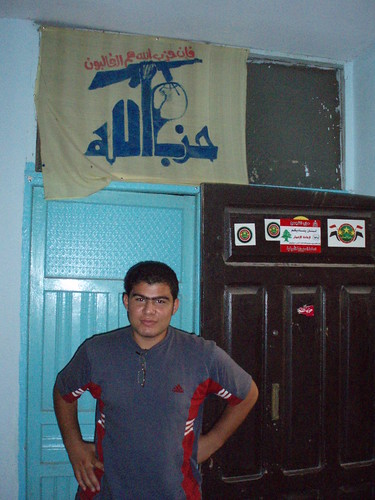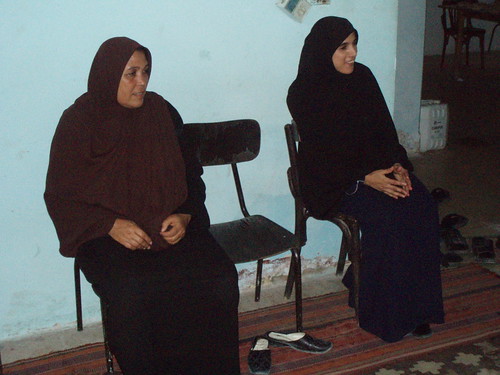Human Rights Organization demand release of Tagamoa Party representative in Sinai
Tag: egypt
دراويش رمضان
The Quran as a supermarket
Sheikh Mustafa al-Shaka, from Al-Azhar’s Center on Islamic Research, accused Hanafi of being a “Marxist” for “uttering such nonsense totally divorced from Islam.
“If apostasy is proven, he who becomes an ex-Muslim should be executed,” Shaka said. In Hanafi’s case, however, “he deserves medical treatment, because he has a psychiatric problem.”
Hanafi, who received his doctorate from the Sorbonne and has taught in Europe and the United States, was close to the fundamentalist Muslim Brotherhood in his youth. After passing through a phase of leftist leanings, he became one of the leading thinkers in the contemporary movement that posits a revolutionary political activism rooted in study of the Muslim scriptures.
Rarely do other thinkers publicly side with him, but one of them is Gamal al-Banna, a Muslim reformist and, ironically, younger brother of Muslim Brotherhood founder Hassan al-Banna.
“I have to say it wasn’t very intelligent comparing the Koran with a supermarket but, in the end he’s not wrong,” said Banna, asserting that “one finds different opinions in the Koran.”
Some of the holy book’s verses are “very dense and confusing expressions” that require interpretation, he said, calling for a “return to the Koran,” interpreting it where necessary in the light of the whole corpus of Islamic theological writing.
Banna himself has been at the receiving end of criticism by traditional Muslim scholars.
His book “The Responsibility for the Failure of the Islamic State in the Modern Age,” in which he suggests ways for Muslim communities in non-Islamic societies to merge better with their environment, was banned in Egypt. In his book, he said that if a woman feels uncomfortable wearing a traditional veil in Europe, then a hat would be permissible.
He recently came under fire for suggesting that smoking during the holy month of Ramadan is permissible.
Even if Hanafi’s argument could have been phrased in a more diplomatic way, I hope other Muslim thinkers will quickly rise to defend him. The concept of ijtihad is hardly something new in Islamic theology, as is the idea that there are different interpretations of the Holy Book (after all there are four official schools of Sunni theology) and it was basically the point Hanafi was making. It is also one that some ideologically radical Islamist groups, such as al-Adl wal Ihsan in Morocco, are making.
“Victim of airport confusion”
Lawyers for some of the students say they were misunderstood and that the U.S. government has been too hard on them. Some students say they fear persecution if sent back to Egypt.
“They are considered pariahs,” said Amy Peck, an Omaha, Neb., lawyer who represents three of the students. “This case has been headlined in Cairo.”
The students disappeared right around the time authorities announced a foiled plot to attack U.S.-bound airliners with liquid explosives.
One of the students, Eslam Ibrahim El-Dessouki, says he fell victim to airport confusion. Extra security checks caused him to miss his connecting flight, and he couldn’t find the other students, he said in a court statement.
He called an uncle who lived in Minnesota, who suggested he go there so relatives could help, he said. El-Dessouki jumped on a bus and headed to the Midwest.
Mohamed Ibrahim El Sayed El Moghazy, 20, Ahmed Refaat Saad El Moghazi El Laket, 19, and Moustafa Wagdy Moustafa El Gafary, 18, also scattered after arriving in New York. They told Peck, their lawyer, that once they landed at the airport, three other students turned to the rest, bid farewell and took off.
That panicked the remaining members of the group, the three said, because all had been told that if any one of them didn’t show up at Montana State University, the rest would lose their passports and immediately get sent back to Egypt.
It sounded all along like these guys wanted to have fun rather than go to some boring seminar about American civics. Stupid of them, but I can certainly understand where they came from.
28,000 per square km
Sinai torture fields
While I was there, I decided to visit the Tagammu Party office, located in downtown Arish, to follow up on the case of detained Kefaya activist Hassan Abdallah, the coordinator of Sinai Youth For Change.
State Security agents broke into Hassan’s house in Arish last month, and kidnapped him. Later, they issued death threats against his two brothers Wael and Mohamed who have taken refuge in the Tagammu office, and have been staging a continuous sit-in.
At the office, I was met by veteran leftist activist Ashraf Ayoub, who’s been civil rights and pro-Palestinian campaigner in Arish since 1984, his 19-year-old son and Sinai Youth For Change activist Shadi, Hassan’s two brothers, mother and sister.
Hassan and his family joined the Tagammu Party during the post-Taba bombings security crackdowns. Hassan’s mother, Kawthar, and his sister Soheir who works as a school teacher, led spontaneous demos by the mothers and women relatives of detainees to protest the widespread torture and kidnappings by State Security agents. They teamed up later with veteran activists like Ashraf Ayoub, and decided to become active members in the left-wing party branch.
“The threats never stopped,” Kawthar said. “State Security Colonel Essam Amer and Major Hussein Mansour told us several times to leave the party, but we refused.”
Hassan’s brother Wael, 22-year-old English literature graduate, had been detained by security 29 October, 2004, part of the mass crackdown on Arish. He was kept for three months at the State Security bureau in Arish, and another three months in Damanhour prison. He told me he was brutally tortured by interrogators, who stripped him off his clothes, threatened him with rape, suspended him from the ceiling with his hands tied to the back, applied electric shocks on several parts of his body—before releasing him saying, “Ma3lesh (never mind), you are not involved.”
The other brother Mohamed, a 32 year old school teacher, was also picked up by State Security on 7 December 2004, and detained for three months, where he received similar treatment.
The younger brother Hassan, attracted the security’s attention, while chanting “Down with Hosni Mubarak” during pro-Lebanese resistance demos in Arish last July.
“State Security officers phoned Hassan several times, with threats and intimidation to leave Tagammu and quit activism,” his mother Kawthar said.
Finally, State Security agents stormed the family’s house on the dawn of 7 September, while Hassan was asleep, his mother recalled. “He was asleep, in his underwear, when they grabbed him. He shouted requesting to see a judicial warrant. They told him, ‘We are State Security. We don’t need a warrant.'”
Hassan was taken in his underwear and thrown into the police van. He was not allowed to take his eyeglasses with him. His two brothers Wael and Mohamed were present in the house, but security agents were not interested in them. On the following day, State Security Major Hussein Mansour phoned in with more threats if the Abdallahs don’t cease their activism, and requested the two brothers to show up the SS Arish bureau for questioning, and to “bring clothes for their naked brother,” the mother said. The two refused, saying the officer’s actions were illegal. Fearing for their safety, the Abdallahs took refuge in the Tagammu office, and said if SS wanted them they could come and get them from the office. For a week, security forces used to raid their empty house every night and smash its furniture. They also told the mother several times her two sons were “considered fugitives now, and if they are seen anywhere in the streets they will be killed.”
Hassan was kept in State Security Arish bureau for a week, then he was transferred to Bourg Al-Arab prison, still without his clothes or eyeglasses–just his underwear, according to his mother, as State Security officers refused to receive the clothes and food his sister and his friend Shadi Ayoub tried to bring him while he was still locked up in Arish.
Hassan has not been presented to the prosecutor still, and his two brothers are still holed up in the Tagammu office for fear of their safety
The coming fight over the Nile
The distribution of Nile River water has been regulated by the 1929 Blue Nile agreement between the United Kingdom and Egypt, and the 1959 agreement between Sudan and Egypt. The latter gave Cairo a de facto right to veto any project using Nile water in other riparian states. Although this treaty remained unchallenged over the years, this is no longer the case. Indeed, many African states have experienced robust G.D.P. growth rates in recent years — with the notable exception of Eritrea, which suffers immensely due to its border war with Ethiopia and its devastating economic policy of self-reliance — and this has increased their need to develop their infrastructure, produce more energy, and provide more water to their populations. Understandably, the majority of the Nile River countries now want to re-negotiate the decades-old treaties.
Considering Egypt’s considerable fall in regional stature over the past few years, it won’t be in a great position to re-negotiate the treaty when the time comes. And while in the past some officials have threatened military action over this issue, I can’t imagine they would really be able to carry them out considering that the other states have a pretty strong case that they would be righting an unfair treaty.
رمضان كريم
My first time
As posted a few days ago, several states in the region could be pushed to start civil nuclear program as a reaction to Iranian nuclear ambitions.
As far as I recall, this is the first time for an Egyptian government or party official to talk about it publicly. I think it is also the first time for Gamal to talk about national security issues, which so far have been the domain of Hosni Mubarak and some security officials. This further positions Gamal, by adapting Ahmadenijads tactics of playing around with the national pride.
The US envoy to Cairo said soon afterwards that the US could be willing to cooperate with Egypt on its program.
So I would speculate that the issue was already raised when Gamal recently went to renew his pilot’s license in the US, as the NDP tried to sell his trip.
Otherwise, I think the best commentary on the NDP conference has once more been chipped in by inerrant Egyptian street humour:
“They called it ‘New thought and a second leap toward the future?’ When was the first time?�
State Security threatens blogger
During the last Kefaya sit-in, Gamal told me he received phone threats from State Security officers, who asked him to take down a posting, where he drew a caricature of Hosni Mubarak urinating on the map of Egypt.
Gamal refused to take it down, and continues to receive the daily phone threats. Yesterday, Gamal was on his way to the Kefaya conference at the Lawyers’ Syndicate, when he was stopped by a security agent who checked his ID, and few minutes later Gamal received another phone threat from security, that he broadcasted to his friends via the mobile phone speaker.
You can read Gamal’s account of the threats, in Arabic, here.
Ma3lesh ya Mr. GEMYHOoOD… You have all my solidarity…








